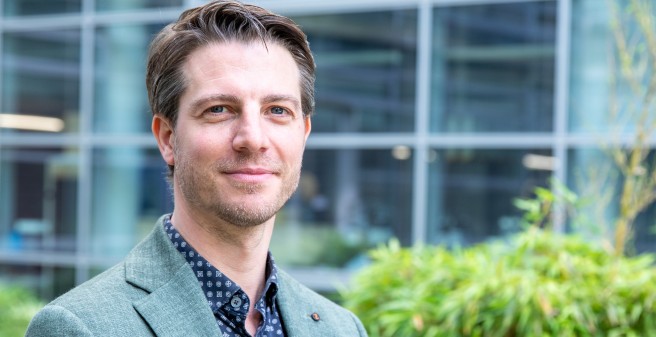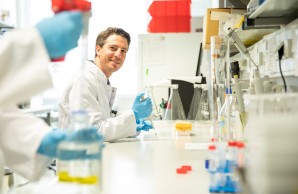A breath of fresh air from Boston
In January 2022, Dr. Manu Beerens moved from Boston in the USA to Hamburg on the river Elbe. His team at the UKE, integrated in the Institute of Clinical Chemistry and Laboratory Medicine, studies cardiovascular diseases at the molecular and physiological level. The Belgian researcher has also taken the time to discover Hamburg – including visits to the football stadium. His favorite club in town? FC St. Pauli.
Manu Beerens likes to be on tour. Recently he explored the hills of Tuscany in Italy on his new racing bike. Between Siena and Florence, he cycled uphill and downhill for a week, crossed forests and vineyards, conquered the gravel paths of the "Strade Bianche" and enjoyed the cypress-lined avenues. "I love sports and being in nature," he says. It has always been like this. “When I was young, I wasn’t interested in things like Playstation and computer games at all. I'd much rather go on rambles through nature or meet up with friends to play football.” For eleven years the left-footer played in a football club in various positions. At school, natural sciences were among his favorite subjects. "Whether it was biology, chemistry, physics or mathematics – I absorbed everything," recalls the now 37-year-old scientist. After graduating from high school, he studied biogenetic engineering in Antwerp and Leuven, "because it created a link between all these disciplines," Dr. Beerens explains. He completed his Ph.D. at the University Hospital in Leuven, where he discovered his passion for scientific work in a medical environment and the possibility to apply the techniques he had learned over the last few years to solve real-life problems. "I think it's great to experiment and discover new things. But what drives me as a scientist above all is the belief that our ideas could eventually change medical care and help patients – even if it’s just one – in a concrete way."
Dr. Beerens specializes in the cardio-vascular system using both animal models and human cells. After graduating, he went to the Brigham and Women's Hospital in the U.S. – first for three and a half years as a postdoc, then for another five as an instructor in medicine at the Harvard Medical School. In the U.S., he conducted intensive research on a protein called Prdm16, which was suspected of being responsible for congenital heart failure (cardiomyopathy). "We hypothesized that a change in this gene not only led to cardiac, but also vascular disease," explains the scientist. To better understand these disease mechanisms, a special animal came to his aid in Boston: the zebrafish. "Since its cardiovascular system and genetic makeup are similar to those of humans, it is particularly well suited as a model to study cardiovascular development and disease," he says. In addition, the fish are transparent during their first days of development, so heart and vascular development can be observed in real-time using high-resolution imaging. "Our goal in the long term is to find drugs that can rescue disorders due to this genetic defect."
Dr. Beerens is also working on this topic with his endothelial cell biology team at the UKE – currently without zebrafish, although he would like to establish this research method here as well. "I’m convinced that they represent a real opportunity to dramatically advance cardiovascular research and beyond," explains the junior group leader. In addition, his lab has discovered numerous other artery and vein-specific proteins with unknown vascular functions. Their role in vascular development and disease, particularly in arterial and venous thrombosis, is something the scientists hope to decipher in order to be able to develop new therapies based on newly identified druggable targets.
And how has Manu Beerens experienced Hamburg away from work? "I'm still at it," he jokes. The language particularly was a barrier at first, but as he slowly understands more German, it’s becoming increasingly easier to make new contacts. He likes the new city – with its many parks, canals and cafés. He is also already very familiar with many a Hamburg peculiarity, such as the rivalry between the HSV and FC St. Pauli football clubs. "Yes, I quickly figured that out and opted for the underdog at the Millerntor," he smiles. He has already been there live three times to support the brown and whites.
When he's not out with colleagues or friends, he also likes to explore Hamburg's relevant record stores and to browse for hours through old and new albums. "I collect everything from jazz and blues to electro and techno," he reveals. As high-tech-based his professional environment may be, for him nothing beats the quiet crackle of a good vinyl. In the world of music, Manu prefers the analogue way of life.
Text: Nicole Sénégas-Wulf, Photos: Eva Hecht

